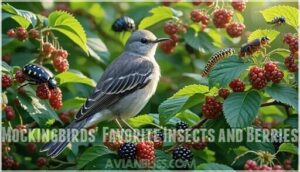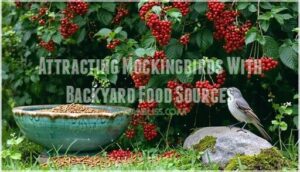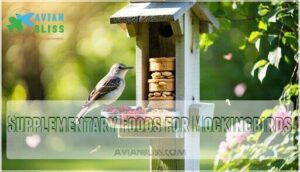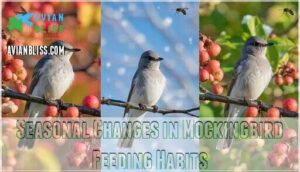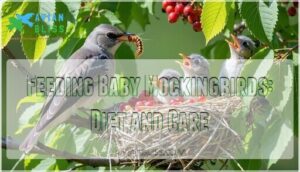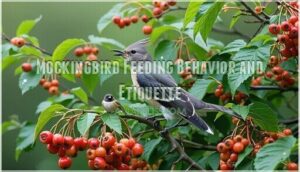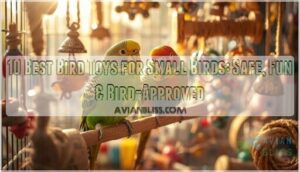This site is supported by our readers. We may earn a commission, at no cost to you, if you purchase through links.
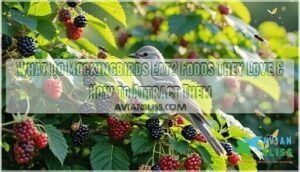
They’re opportunistic feeders, meaning they adapt to what’s available—feasting on protein-packed insects during warmer months and switching to fruit and seeds in colder seasons.
If you’ve got a garden, they might even snack on your tomatoes or grapes! Their foraging habits are efficient, often hopping or flying low to spot food.
Want to attract them? Try offering mealworms, suet, or fresh fruit in a feeder. These clever birds know how to find a feast wherever they go!
Table Of Contents
- Natural Diet of Mockingbirds in The Wild
- Mockingbirds’ Favorite Insects and Berries
- Attracting Mockingbirds With Backyard Food Sources
- Supplementary Foods for Mockingbirds
- Seasonal Changes in Mockingbird Feeding Habits
- Feeding Baby Mockingbirds: Diet and Care
- Mockingbird Feeding Behavior and Etiquette
- Frequently Asked Questions (FAQs)
- Are mockingbirds omnivores?
- What do mockingbirds eat in winter?
- Do mockingbirds eat insects?
- What do Baby mockingbirds eat?
- Do mockingbirds eat seeds?
- What do gray mockingbirds eat?
- What can I feed a mockingbird?
- What trees do mockingbirds live in?
- How do you befriend mockingbirds?
- Do mockingbirds eat lizards?
- Conclusion
Natural Diet of Mockingbirds in The Wild
Mockingbirds in the wild rely on a balanced diet of insects, fruits, and seeds to meet their nutritional needs.
Their adaptability allows them to hunt arthropods like beetles and grasshoppers in warmer months while turning to berries and other fruits during winter, which is a key aspect of their adaptability.
Insects and Arthropods Consumed
In the context of insects, mockingbirds are skilled hunters with a taste for variety.
They thrive on beetle prey, grasshoppers, and caterpillars, often using quick reflexes to catch crickets or perform a fly catch mid-air.
Spiders delicately perched in webs and ants on the ground also make up part of their ant diet.
Their earthworm hunt showcases their adaptability, as they hop and dart across open spaces.
Mockingbirds rely heavily on insects and arthropods, especially during breeding, ensuring their young get the protein they need.
Every shrub, tree, or lawn becomes a buffet for these resourceful foragers.
Preferred Fruit Varieties
Mockingbirds are true experts regarding fruit, especially during colder months when insects are less active. They’re drawn to berries and fruits that pack a punch of flavor and nutrients.
Mockingbirds thrive on nutrient-packed berries and fruits, turning winter’s scarcity into a flavorful feast.
If you want to attract these feathered gourmands, consider offering their favorites:
- Elderberries: These tiny, nutrient-rich morsels are a winter staple.
- Blackberries: Juicy and full of energy, they’re hard to resist.
- Mulberries: A sweet and satisfying treat.
- Grapes: Easy to pluck and swallow whole.
- Oranges and Apples: Sliced fruits are an invigorating delight.
Planting fruit-bearing bushes or trees can turn your yard into a mockingbird paradise!
Seasonal Variations in Diet
A mockingbird’s omnivorous diet highlights their incredible adaptability through seasonal food changes.
In summer, these insect-eating birds thrive on an insect abundance, feasting on caterpillars, beetles, and grasshoppers to fuel their breeding season. As fall approaches, their dietary shifts include more fruits and seeds, preparing for colder months.
Winter forces them to rely on fruit variations like holly, juniper, and elderberries, with seeds supplementing their needs during scarce insect availability. Spring marks a return to protein-packed insects, aligning with nesting season demands.
Here’s a breakdown of their seasonal diet:
| Season | Primary Foods | Nutritional Focus |
|---|---|---|
| Summer | Insects (beetles, ants) | High protein |
| Winter | Fruits, seeds | Carbs, fats for energy |
| Spring | Insects, berries | Protein for nesting |
This mockingbird diet guarantees survival year-round!
Foraging Techniques and Behaviors
You’ll be amazed watching these insect-eating birds in action. Their foraging behavior is a mix of ground foraging, tree searching, and wing hunting. Mockingbirds flash white wing patches, startling prey before swooping in.
They’re also fruit-eating birds, plucking berries effortlessly.
Ever notice them hopping? That’s nest foraging, a clever trick to flush out insects. With their omnivorous diet, they’re nature’s multitaskers, balancing bird nutrition with skillful food caching and hunting precision.
Mockingbirds’ Favorite Insects and Berries
Mockingbirds rely on a mix of protein-packed insects like beetles, grasshoppers, and caterpillars, along with nutrient-rich berries such as elderberries and blackberries.
Understanding their dietary needs helps you create an inviting habitat that meets their needs year-round, which is crucial for supporting mockingbirds.
Top Insect Species in Mockingbird Diet
You’ll often find these insect-eating birds perfecting their fly-catching skills, snagging beetle species, caterpillars, and grasshoppers mid-air.
They’re relentless when chasing ants, wasps, or cicadas, using sharp eyesight and quick reflexes. Watching them hunt is like seeing nature’s acrobats at work—darting, hopping, and pouncing with precision.
Their protein-packed menu helps them stay fueled for their busy lives. To attract these birds, understanding insect based foods is vital for creating a welcoming environment.
Most Popular Berries for Mockingbirds
Berry types play a big role in what fruit-eating birds like mockingbirds enjoy.
These curious birds have a knack for finding nature’s sweetest treats, especially berries packed with nutrient value.
If you’re wondering what do birds eat in regard to fruit, here are their top picks:
- Elderberries – A juicy delight they’ll fiercely protect.
- Wild Blackberries – Summer’s irresistible offering.
- Juniper Berries – A winter favorite for energy.
- Pokeweed Berries – Native treats they relish.
- Hawthorn Berries – Bright, red, and irresistible.
Planting berry bushes guarantees your garden layout attracts these fruit-loving visitors.
Nutritional Benefits of Preferred Foods
Ever wonder how fruit-eating birds like mockingbirds stay so energetic? Their diet is a perfect trifecta of protein sources, berry advantages, and seed value.
Insect benefits include protein for muscle growth and flight strength.
Berries, packed with antioxidants, boost immunity and overall health.
Seeds add essential fats for long-lasting energy.
This balanced bird diet fuels their lively songs and acrobatics, making them nature’s tiny powerhouses. So, what do birds eat? Everything they need to thrive!
Feeding Habits and Patterns
Mockingbirds are true masters of foraging strategies, blending precision and adaptability in their eating habits.
These insect-eating and fruit-eating birds rely on natural food sources and exhibit fascinating feeding patterns:
- They memorize prime spots, ensuring quick access to seasonal adaptations in food supplies.
- With sharp reflexes, they catch insects mid-flight, showcasing efficiency.
- Opportunistic by nature, they sometimes "borrow" meals from other birds, negotiating food competition with clever tactics.
Their feeding frequency adjusts to environmental changes seamlessly.
Attracting Mockingbirds With Backyard Food Sources
To attract mockingbirds, you’ll need to offer a mix of their favorite foods and create a welcoming habitat.
By providing fruits, berries, and occasional mealworms, along with safe nesting spots, you can turn your backyard into a mockingbird haven.
Suitable Bird Feeders for Mockingbirds
Choosing the right feeder types is key to attracting mockingbirds. These agile, fruit-eating and insect-eating birds prefer flat-surface feeders, suet feeders, or mealworm trays that mimic their natural foraging habits. You can find flat surface feeder products online.
Place bird feeders in open spaces with clear sightlines, ensuring quick escape routes—mockingbirds value safety as much as food.
A fruit platter with sliced oranges or apples can also appeal to their taste for variety.
Avoid crowded or high-traffic areas; mockingbirds are territorial and may shy away from competition.
For effective bird feeding tips, keep feeders low-maintenance and natural-looking, blending seamlessly into your garden to create a welcoming environment.
Recommended Types of Birdseed
When it comes to bird feeding, mockingbirds aren’t big on seeds, but a well-thought-out birdseed mix can still catch their interest.
Offering a blend with safflower seeds, white millet, and black oil sunflower seeds is a good start. You can find a variety of suitable birdseed mixes online.
Add a sprinkle of nyjer seeds for variety. Use open platform bird feeders, as mockingbirds prefer space to feel secure.
While suet feeders and mealworm options remain their favorites, seeds can be a backup snack when other foods run low.
- Seed Types mockingbirds tolerate
- Birdseed Mix designed for variety
- Sunflower Seeds for added appeal
- Suet Feeders complementing seeds
- Mealworm Options for protein boost
Offering Fruits and Berries
Adding fruits and berries to your yard is a surefire way to attract mockingbirds.
These clever birds are drawn to the vibrant colors and sweet tastes, especially during the warmer months.
Think of your yard as their personal fruit buffet, and you’ll have them visiting in no time.
Here’s a quick list of their favorites:
- Fresh blueberries and blackberries – bursting with nutrients and flavor.
- Sliced apples and pears – just be sure to remove the seeds.
- Halved grapes – red or green, they’re both a hit.
- Cut strawberries – no stems, please.
- Wild elderberries – a natural delight they can’t resist.
When offering strawberries, consider the fruit safety guidelines to guarantee a healthy treat.
Place these fruits on shallow dishes or raised platforms to keep them clean and accessible.
Refresh daily, toss spoiled pieces, and enjoy watching your feathered guests relish nature’s candy in your bird-friendly garden.
Creating a Mockingbird-friendly Garden
A thoughtful Garden Layout can turn your yard into a haven for fruit-eating and insect-eating birds like mockingbirds.
Add bird baths for drinking and bathing, and dense shrubs for nesting.
Plant bird-friendly plants like native berry bushes—elderberry, dogwood, and juniper—offering natural food year-round. Keep soil pesticide-free to support healthy insect populations, essential for these backyard birds.
Prioritize Wildlife Conservation by creating a safe, inviting space filled with resources mockingbirds need to thrive.
Supplementary Foods for Mockingbirds
You can easily support mockingbirds by offering supplementary foods that mimic their natural diet.
Options like suet, mealworms, unsalted peanuts, and dried fruits provide essential nutrients and attract these birds to your yard, which is a key aspect of supporting mockingbirds.
Suet and Mealworms as Food Options
Suet and mealworms are fantastic supplemental options for mockingbirds, offering essential energy and nutrients. Suet benefits these birds, especially in winter, by providing high-calorie fats that help them thrive during colder months. Mealworm nutrition is equally important, delivering protein-packed sustenance that mirrors their insect-heavy natural diet.
To encourage visits, place suet cakes in specialized feeders or hang them securely in your yard. Scatter mealworms—live, dried, or freeze-dried—in shallow dishes or directly on the ground for easy access.
- Watch mockingbirds flutter excitedly at feeders.
- Spot their swooping agility as they grab mealworms.
- Notice their appreciation for a well-stocked habitat.
Feeder placement in quiet areas guarantees a safe, inviting environment for this fascinating bird species. Using the right suet feeder types can substantially enhance the feeding experience for mockingbirds.
Offering Peanuts and Other Nuts
Mockingbirds may not be classic seed-eaters, but peanuts are a treat they’ll enjoy. Crush unsalted peanuts for easy snacking—packed with protein and healthy fats, they’re a great addition to bird nutrition.
Use platform or ground feeders for better access. Curious about nut variety? Check out this quick guide:
| Nut Type | Preparation | Benefits |
|---|---|---|
| Peanuts | Crushed, unsalted | Protein boost |
| Almonds | Chopped, unsalted | Healthy fats |
| Walnuts | Crushed, unsalted | Energy source |
| Mixed Nuts | Finely chopped | Balanced diet |
Keep nuts fresh in airtight containers to avoid spoilage! This ensures the nuts remain a healthy snack for the birds.
Dried Fruits and Raisins
If you’ve already tried peanuts, why not introduce dried fruits to your backyard buffet? Mockingbirds love these high-energy treats, especially raisins.
Packed with quick-release sugars, they’re like nature’s energy bars for birds. Plus, dried fruits are a great way to keep bird food fresh and nutritious year-round.
Here are some top picks:
- Raisins – A classic choice with excellent raisin nutrition for active birds.
- Unsweetened dried cranberries – Great for winter months.
- Chopped dried apricots – Full of natural nutrients.
- Golden sultanas – Bright, easy-to-spot Mockingbird snacks.
Offer these on flat surfaces or shallow feeders for easy access.
Commercial Mockingbird Food Blends
In the context of commercial bird food for mockingbirds, a well-balanced Blended Diet is key.
Look for Seed Mixes, Food Pellets, and Nutrient Supplements designed to mimic their natural diet. Many blends include dried mealworms, fruits, and Suet Alternatives, ensuring proper nutrition year-round.
Here’s a quick comparison of options:
| Type | Main Ingredients | Best For |
|---|---|---|
| Seed Mixes | Sunflower, millet, oats | General feeding |
| Food Pellets | Protein, vitamins | Balanced nutrition |
| Suet Alternatives | Fats, dried insects | Winter energy boost |
| Commercial Seeds | Mixed grains, berries | Variety and appeal |
| Blended Diets | Mealworms, fruits, seeds | Year-round feeding |
With these blends, your backyard guests will thrive!
Seasonal Changes in Mockingbird Feeding Habits
Mockingbirds adjust their diets throughout the year to match seasonal food availability, shifting between insects, fruits, and seeds.
Understanding these changes helps you provide the right food at the right time, ensuring they stay well-fed and active in every season.
Summer Diet Preferences
Summer means a feast of insects for mockingbirds, with protein-packed bugs making up 85% of their diet.
Their insect-catching skills are impressive, whether they’re swooping mid-air or hopping on the ground.
Fresh fruits and berries still play a supporting role, adding balance to their summer foraging.
- Aerial acrobatics to snatch moths and butterflies mid-flight
- Ground-hopping precision to grab beetles and grasshoppers
- Leaf-plucking mastery to find caterpillars and ants
- Berry nibbling to round out their bird nutrition
Their seasonal eating habits guarantee they thrive in the heat.
Winter Food Adaptations
When cold weather strikes, these adaptable birds turn to winter berries like holly and juniper for sustenance, making up 85-90% of their winter food.
You’ll see them snow foraging through frosted bushes, expertly locating fruits and seeds.
Frost survival also includes visits to suet feeders or seed feeders when natural options are scarce.
Their resourceful habits guarantee they thrive, even when nature seems stingy with its offerings.
Spring and Fall Dietary Transitions
As the seasons change, mockingbirds adjust their diet to meet shifting nutrient needs.
Spring and fall bring noticeable dietary shifts as they adapt to available food sources.
Here’s how their foraging changes during these transitional seasons:
- Early spring: Mockingbirds hunt beetles and ants, taking advantage of emerging insects.
- Mid-spring: Caterpillars and flying insects dominate their menu.
- Late summer: They balance insects with the season’s first fruits and berries.
- Early fall: Wild fruits like elderberries and blackberries take center stage.
- Late fall: Heavy berry consumption prepares them for winter.
These seasonal food shifts highlight their versatility, ensuring they thrive through nature’s ever-changing offerings.
Impact of Weather on Food Choices
Mockingbirds are masters of adapting to weather patterns.
During cold snaps, they’ll feast on energy-packed wild fruit like berries, while rainy days bring earthworms and other insects to their foraging menu.
Dry spells push them toward water-rich fruits and garden sprinklers for hydration and hunting.
As omnivores, their dietary adaptations to seasonal shifts guarantee survival, even during food scarcity, and they truly thrive despite nature’s unpredictable climate effects, which is a testament to their ability to adapt!
Feeding Baby Mockingbirds: Diet and Care
Feeding baby mockingbirds requires careful attention to their nutritional needs, as their rapid growth depends on a protein-rich diet.
You’ll need to provide soft insects like mealworms and small fruits in appropriate amounts to guarantee they thrive.
Nutritional Needs of Nestlings
A nestling’s diet is all about high-protein meals to fuel rapid growth.
Parent mockingbirds work tirelessly, delivering food every 15-20 minutes, guaranteeing their chicks get the best start. Think of it as nature’s baby food—soft, nutritious, and perfectly suited.
Here’s what makes up their menu:
- Caterpillars: Soft-bodied and easy to digest, packed with protein.
- Earthworms: A natural protein powerhouse for growing chicks.
- Beetle larvae: Tender and nutrient-dense for ideal development.
- Small spiders: Rich in essential nutrients and easy to consume.
By regurgitating these meals, parents guarantee nestlings receive the perfect blend of nutrients, setting them up for a healthy fledgling stage.
Appropriate Foods for Fledglings
As your fledgling grows, proper nutrition is essential for their strength and energy.
Here’s a quick guide to feeding these young birds:
- Fresh mealworms—packed with protein for healthy growth.
- Soaked cat food—easy to digest and nutrient-rich.
- Mashed apples and berries—a natural sugar boost they’ll love.
- High-protein baby cereal—mix with water for a soft, nutritious meal.
- Small earthworms or crickets—mimic their natural foraging instincts.
Always keep portions soft and small, with fresh water nearby to support hydration and digestion.
Feeding Frequency and Amounts
Baby mockingbirds rely on structured feeding schedules to meet their nutrient intake needs.
At 1–2 weeks, feed them 6–8 times daily with ½ teaspoon per meal. By 3–4 weeks, reduce to 4–5 feedings of 1 teaspoon each. At 5–6 weeks, offer 3–4 meals of 2 teaspoons.
Watch for chirping or open mouths—classic eating habits signaling hunger. Balancing meal frequency and food quantity guarantees healthy growth, whether you’re offering insects, fruit, or seeds.
Understanding proper feeding techniques is vital for their development, and can be found at feeding techniques.
Risks of Improper Feeding
Feeding dangers can arise if you’re not careful with baby mockingbirds.
They’re delicate and rely on precise care to avoid malnutrition risks or diet imbalance. Mistakes, even well-intentioned ones, can have lasting effects.
Here’s what to avoid:
- Improper foods: Skip human snacks; stick with soft fruits, bird seeds, or insects for these insect-eating birds.
- Overfeeding: Too much food disrupts digestion and stunts growth.
- Pesticides: Contaminated food harms their health and the environment.
- Overreliance on feeders: Dependence on artificial feeding weakens natural foraging instincts.
Stick to their natural diet, and you’ll help them thrive without unintentionally harming their growth or independence.
Mockingbird Feeding Behavior and Etiquette
When mockingbirds feed, they often display territorial behavior, aggressively guarding their chosen spots from other birds.
Understanding these interactions can help you create a more harmonious feeding environment in your yard.
Territorial Behavior at Feeding Sites
Ever wonder why mockingbirds seem like the divas of your yard? Their territorial behavior is all about site dominance.
These fruit-eating birds fiercely guard food sources, using territory marking and aggressive behavior to keep rivals away. Expect dramatic feeding fights, especially near bird feeders or fruit-laden bushes.
Mockingbirds’ foraging strategies prioritize control, ensuring their habitat meets their needs.
To minimize clashes, scatter bird seeds and fruits across multiple feeding stations. This spreads out the action and reduces conflict.
By understanding their territorial instincts, you can create a peaceful mockingbird habitat where all your feathered visitors feel welcome.
Interactions With Other Bir
Mockingbirds are notorious for their territorial disputes, often chasing off birds like blue jays, fish crows, or even sharp-shinned hawks.
Their aggressive displays include dive-bombing, loud songs, and bold mimicry effects to intimidate rivals. These complex bird social interactions influence resource allocation and territorial defense.
During nesting seasons, food competition intensifies, and they’ll fiercely guard feeders or berry bushes.
- Food Competition: Mockingbirds prioritize insects like beetles and caterpillars, often outmaneuvering others.
- Aggressive Displays: They mimic predators or dive at intruders to secure feeding spots.
- Nesting Interference: They defend nests against American crows, scrub jays, or any perceived threat.
Their boldness guarantees they dominate backyard food sources.
Frequently Asked Questions (FAQs)
Are mockingbirds omnivores?
Think of mockingbirds as nature’s versatile diners.
They’re omnivores, enjoying a balanced diet of insects like beetles and caterpillars, alongside fruits, seeds, and even small lizards.
Their adaptability keeps them thriving year-round.
What do mockingbirds eat in winter?
In winter, you’ll see mockingbirds munching on berries, grapes, and other wild fruits when insects are scarce.
They rely on plants like elderberry, holly, and juniper, making these natural food sources essential for survival.
Do mockingbirds eat insects?
In the case of insects, mockingbirds don’t mess around—they’ll eat everything from beetles and grasshoppers to caterpillars and flies.
They’re agile hunters, even snatching prey mid-air or pouncing on unsuspecting bugs from the ground, making them effective predators.
What do Baby mockingbirds eat?
Young mockingbirds rely on their parents to feed them a diet rich in protein, primarily soft-bodied insects like caterpillars, mealworms, and grasshoppers.
As they grow, they’re gradually introduced to fruits and seeds.
Do mockingbirds eat seeds?
Ever wonder if mockingbirds munch on seeds?
They do! Sunflower seeds, oats, and wheat are fair game.
While seeds aren’t their main course, these versatile omnivores happily snack on them when other food is scarce.
What do gray mockingbirds eat?
Gray mockingbirds eat a mix of insects, fruits, and seeds.
They’ll hunt beetles, grasshoppers, and caterpillars, devour berries like elderberry or blackberry, and even snack on sunflower seeds or grains.
Their diet is impressively versatile!
They forage for a wide variety of food items, making them versatile eaters in their natural habitat.
What can I feed a mockingbird?
Mockingbirds are like nature’s food critics—they’ll love sliced fruits like apples, bananas, or oranges.
Offer mealworms, unsalted peanuts, or suet for protein.
Native berry bushes like elderberry or blackberry also make your yard irresistible.
What trees do mockingbirds live in?
You’ll find mockingbirds favoring trees like oaks, pines, and maples for their nests.
They prefer dense, covered branches for protection, typically 3-10 feet off the ground, ensuring safety and a good vantage point.
How do you befriend mockingbirds?
Like building trust with a shy neighbor, offer mealworms, berries, or fruit slices in quiet garden spots.
Keep your yard pesticide-free, add a birdbath, and stay patient—mockingbirds value consistent kindness and safe environments.
Do mockingbirds eat lizards?
Yes, they do! Mockingbirds occasionally hunt small lizards, adding them to their protein-rich diet.
Their sharp beaks and quick reflexes make them skilled at catching these tiny reptiles, especially when other food sources are scarce, utilizing their sharp beaks.
Conclusion
Did you know mockingbirds can eat over 50% insects during summer but switch to mostly fruits in winter?
Their adaptable diet includes beetles, grasshoppers, mulberries, and elderberries, making them true opportunistic feeders.
If you’re wondering what do mockingbirds eat, the answer lies in variety—offering mealworms, suet, or fresh fruit can attract them to your yard.
By understanding their seasonal preferences and providing the right foods, you can enjoy these clever birds up close all year long.

